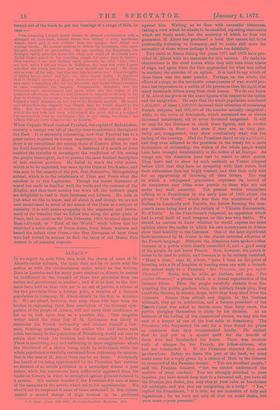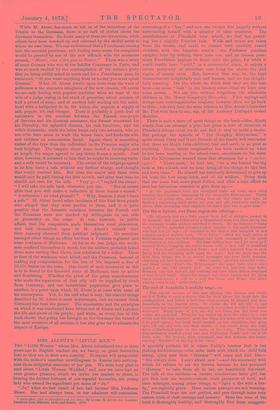ALSACE.*
IF we regret to miss from this book the charm of some of M. Abont's earlier volumes, the fault does not lie so much with the author as with the circumstances under which he has written. Born in Lorraine and for many years resident in Alsace, he cannot be indifferent to the transfer of those two provinces from one nation and government to another ; and if it be true, as the Ger- mans have told us, that this act is an act of justice, a release of the two provinces from a foreign yoke, a reunion of a German population to Germany, M. About should be the first to welcome it. We are afraid, however, that even those who have been the loudest in expressing their firm conviction of the German sym- pathies of the people of Alsace, will not carry their confidence so far as to look upon him as a possible ally. One sanguine writer asked the other day if M. Erckmann was likely to surrender his French nationality and declare himself a Ger- man, thinking, perhaps, that the author who had borne such noble testimony to the patriotism of Phalsbourg would not care to retain that which his brothers had been compelled to forfeit. There is something nay' and refreshing in these suggestions about the likelihood of a choice being made by individuals while the whole population is carefully restrained from expressing its opinion. But in the case of M. About there can be no doubt. Everybody has heard of his being apprehended by the Prussians last autumn on account of an article published in a newspaper almost a year before, while his sentiments have sufficiently appeared from his books on Greece, in which he inveighed against plunder reduced to a system. We cannot wonder if the Prussians felt sore at some of the sarcasms in the article which led to his apprehension. We should not be surprised if some of those contained in this volume caused a second aharge of high treason to be preferred * E. About: Alsace, 1871-1872. Paris and London: Hachette. 1873.
against him. Writing as he does with excusable bitterness, taking a view which he admits to be mudded, repeating statements which are freely made, but the accuracy of which he does not guarantee, M. About has produced a book that cannot fail to be profoundly irritating to Germany, and to excite still more the animosity of those whose feelings it reflects too faithfully.
Two visits to Alsace during the years 1871 and 1872 have pro- vided M. About with the materials for this volume. He made his observations in the chief towns while they still bore fresh traces of siege, and again when the time approached for what was called in mockery the exercise of an option. It is hard to say which of these times was the most painful. Perhaps, on the whole, the effects of a siege, as the inevitable consequences of war, would pro- duce less impression on a native of the provinces than the sight of so many thousands driven away from their homes. We do not know if M. About has given us the exact figures with respect to the option and the emigration. He says that the whole population numbered 1,600,000; of these 1,100,000 declared their intention of remaining French subjects, and 600,000 of the number actually emigrated ; while in the town of Schlestadt, which contained ten or eleven thousand inhabitants, six or seven thousand emigrated. It will be easy for the Germans to check these figures, and to correct any mistake in them ; but even if they are, as they pro- bably are, exaggerated, they show conclusively what was the feeling of the country. Had the Prussians dared to try a plebiscite, had they even adhered to the provision in the treaty for a mere declaration of citizenship, the wishes of the whole people would have been brought unmistakably to the notice of all Europe. As things are, the Alsaciens have had to resort to other means. They have had to show by such methods as Venice adopted before 1866 that they have no sympathy with their rulers, that their submission does not imply consent, and that they only wait for an opportunity of throwing off their fetters. The way in which a subjugated population expresses its hatred of its conquerors may often seem puerile to those who are not under any such necessity. The present writer remembers talking to a Frenchman in the early part of 1859 about the phrase "Viva Verdi !" which was then the watchword of the Italians in Lombardy and Venetia, the letters forming the com- poser's name being used as the initials of "Vittorio Emmanuele, Re d'Italia." In the Frenchman's judgment, an opposition which had to avail itself of such weapons as this was very feeble. We should be curious to know whether he would express the same opinion about the modes in which his own countrymen in Alsace show their hostility to the Germane. One of the most significant facts mentioned by M. About is the almost universal adoption of the French language. Hitherto the Alsaciens have spoken either German or a patois which closely resembled it, and a good many of the people do not know French. Now, however, the patois is never to be used in public, and German is to be entirely banished. "Many a time," says M. About, "have I been on the point of bursting into a fit of laughter at hearing some one with a formid- able accent reply to a Prussian, Moi Vranzais, moi pas safoir " Some, too, he adds, go farther,, and say, "Pea poufoir Niemand," a phrase which is a literal reproduction of the German idiom. Then the people carefully abstain from fre- quenting the public gardens when the military bands play, they avoid the theatre, in streets, shops, cafes they keep aloof from the Germans. Sooner than submit any dispute to the German tribunals, they go to arbitration, and a former president of the Fiona Court was asked to decide more than forty cases, the parties pledging themselves to abide by his decision. As an instance of the feeling of the commercial classes, we may cite the case of a keeper of one of the best cafes at Strasbourg. The Prussians who frequented his café for a time found his prices so enormous that they remonstrated loudly. He replied that he had put on a special tariff for the benefit of those who had bombarded his house. There was another scale of charges for the French, his fellow-citizens, who had not bombarded it. If the Prussians objected they must go elsewhere. Before we leave this part of the book, we must make room for a reply given by a citizen of Metz to the General in command of the Prussian troops. "You are excellent people," said the Prussian General, "but we cannot understand the motives of your conduct. You are strongly attached to your families, you have struck deep root in a favoured soil, you have all the liberties you desire, you may stay at your cafes or beerhouses till midnight, and yet you are emigrating in a body." "Yes," replied the Frenchman, "it is true, we are monsters of folly and ingratitude ; for we have not only all that we could desire, but even more,—your presence." While M. About has much to tell us of the behaviour of the French to the Germans, there is no lack of stories about the Germans themselves. No doubt many of these are inventions, while others have been touched up and coloured by the skilful artist to whom we owe them. We can understand that a Frenchman coming into the annexed provinces, and finding some cause for complaint would be greeted by one of the new officials with the courteous remark, "lifossie, vou.s n'etes plus en France." There was a story of some German who was at the Schiller Centenary in Paris, and was so much exalted by the contemplation of his nation's glory that on being civilly asked to move and let a Frenchman pass, he exclaimed, "1 you want anything from us to-day you must speak German." What M. About dwells upon more than the want of politeness is the excessive stinginess of the new-corners. Of course we are only dealing with popular tradition when we hear of the wife of a judge laying in her stock of groceries, which consists of half a pound of soap ; and of another lady sending out the salad- bowl with a halfpenny in it, for which she expects a supply of salt, pepper, oil, and vinegar. There is probably a good deal of caricature in the contrast between the French sous-prget of Saverne and his German successor, the former renowned for his liberality, his splendid dinners, his rich furniture, and his wife's diamonds; while the latter keeps only two servants, who go out with bare arms to wash the house linen, and feeds his wife and children on ammunition bread. Again, there is something rather of the type than the individual in the Prussian major who took lodgings. The bargain about them lasted a fortnight, and at length the major agreed to pay thirty francs a month. Just then, however, it occurred to him that he might be receiving visits, and a sofa would be necessary. The owner of the lodgings agreed to let him have a sofa without any further charge, and thought that would content him. But then_ the major said these visits would only be paid during the first month, and after that time he should not care for the sofa. "Very good," replied the owner ; "I will take the sofa back whenever you like. "But of course after that you will make a reduction of three francs a month." "A reduction ! on what ground ? " "Why, because I shan't have a sofa." M. About heard other incidents of this kind from people who alleged that they were parties to them, and it is quite possible that the domestic relations between the French and the Prussians were not marked by willingness on one side or generosity on the other. It was, however, in public affairs that the conquerors made themselves most obnoxious, and laid themselves open to M. About's remark that their rapacity obscured their political judgment. He mentions amongst other things an affray between a Prussian regiment and some workmen at Mulhouse. As far as we can judge, the work- men con-fined themselves to words, but the soldiers probably found these more cutting than blows, and retaliated by a volley. Three or four of the workmen were killed, and the Prussians, instead of making any compensation for the loss of life, imposed a fine of 50,000 francs on the town. One result of such treatment as this is to be found in the deserted state of Mulhouse, once so active and flourishing. Whether the place of the great manufacturers who made the reputation of that city will be supplied by rivals from Germany, and one industrious population give place to another, is a point upon which M.'Abont is at issue with some of his countrymen. Yet, be the end what it may, the state of things described by M. About is most unfortunate, and we cannot think Germany has been the gainer. The annexation and the principles on which it was conducted have driven out of Alsace and Lorraine the life and sinew of the people ; and while, as every line in this book shows, that policy has brought on the Germans the hatred of the most sensitive of all nations, it has also gone far to alienate the respect of Europe.











































 Previous page
Previous page